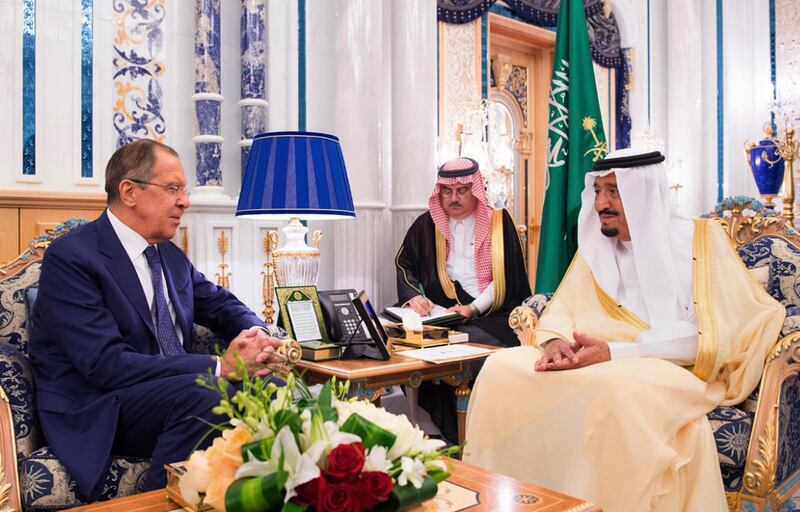Dana Moukhallati
Saudi Arabia and Russia agreed on the importance of de-escalation zones in Syria as well as efforts to establish a united delegation of the Syrian opposition for peace talks in Geneva.
Russian foreign minister Sergey Lavrov arrived in Jeddah on Saturday and met with Saudi Arabia’s King Salman to discuss the latest international and regional developments.
#Russia #SaudiArabia #Djidda #diplomacy #Russian FM Sergey #Lavrov met with King of #Saudi Arabia Salman bin Abdulaziz Al Saud. pic.twitter.com/hIdQFsZOGb
— MFA Russia 🇷🇺 (@mfa_russia) September 10, 2017
Mr Lavrov also held talks with his Saudi counterpart, Adel Al Jubeir, with the discussions focusing on the situation in Syria. He is scheduled to then head to Jordan, where he will meet with King Abdullah and Jordanian foreign minister Ayman Safadi.
“We are supporting Saudi Arabia’s efforts for one [opposition] delegation,” Mr Lavrov said after his meeting with Mr Al Jubeir. “We believe that when unification happens — and I think it will happen — that we need to motivate members of this delegation to work out a platform that would help them with the Geneva negotiations.”
Mr Al Jubeir said: “Our position is that we have to maintain Syria’s unity, take into consideration the interest of all groups and follow the provisions of UN Security Council Resolution 2254.
“As for Geneva talks, we support them.”
Resolution 2254 outlines a road map for a peace process in Syria, while setting a timetable for talks between government and opposition members.
Read more: Syria opposition talks in Riyadh end in stalemate
Mr Lavrov said on Friday that he hopes talks in the Kazakh capital Astana later this week will lead to the creation of a fourth de-escalation zone in the rebel-held province of Idlib.
“We believe there are signs of tangible progress. Three de-escalation zones are operational in south-western Syria, Eastern Ghouta and northern Homs province,” he said in Moscow. “It’s the most complex one, that’s why its co-ordination has taken so long. After that, we will be in an even better position to improve the humanitarian situation there.”
The Astana talks, which will take place on September 13-15, are sponsored by Russia and Iran, who support the Assad government, and Turkey, a supporter of rebel groups. The agreement to set up de-escalation zones calls for halting the use of weapons, including air strikes, and allowing humanitarian aid to enter the areas.
Some experts have argued that Saudi Arabia may be coming around to the idea that Mr Al Assad will be part of a future Syria. However, Riyadh maintains that the goal remains “a new future for Syria without Bashar Al Assad”.
“The Saudis now realise that the Russians could be the only party that can settle the Syria conflict,” Mustafa Alani, head of the defence and security department at the Gulf Research Centre in Dubai told Bloomberg. “They don’t have a problem with the idea that the regime can stay.”
In August, talks in Riyadh between Saudi-backed Syrian opposition High Negotiations Committee, and two other blocs closer to Moscow ended in stalemate with the fate of Mr Assad still an obstacle in establishing a unified front for peace talks.
Another round is scheduled in Riyadh next month with the hopes of uniting the three groups.
On Saturday, Syrian troops broke ISIL siege of Deir Ezzor military airport, while US-backed forces launched an offensive against the jihadists elsewhere in the province.
Read more: US-backed forces, Syrian army advance separately on ISIL in Deir Ezzor
Russia said that its planes provided cover to the Assad forces and carried out “massive air strikes” that helped them recapture the airport from ISIL.
"Syrian government forces, with Russian air support … inflicted a crushing defeat on [ISIL] around Deir Ezzor surpassing all the other victories achieved in the past three years," the ministry said.
The Britain-based Syrian Observatory for Human Rights said the latest development will allow Syrian troops to "link up all the neighbourhoods they hold in western parts of Deir Ezzor city".





